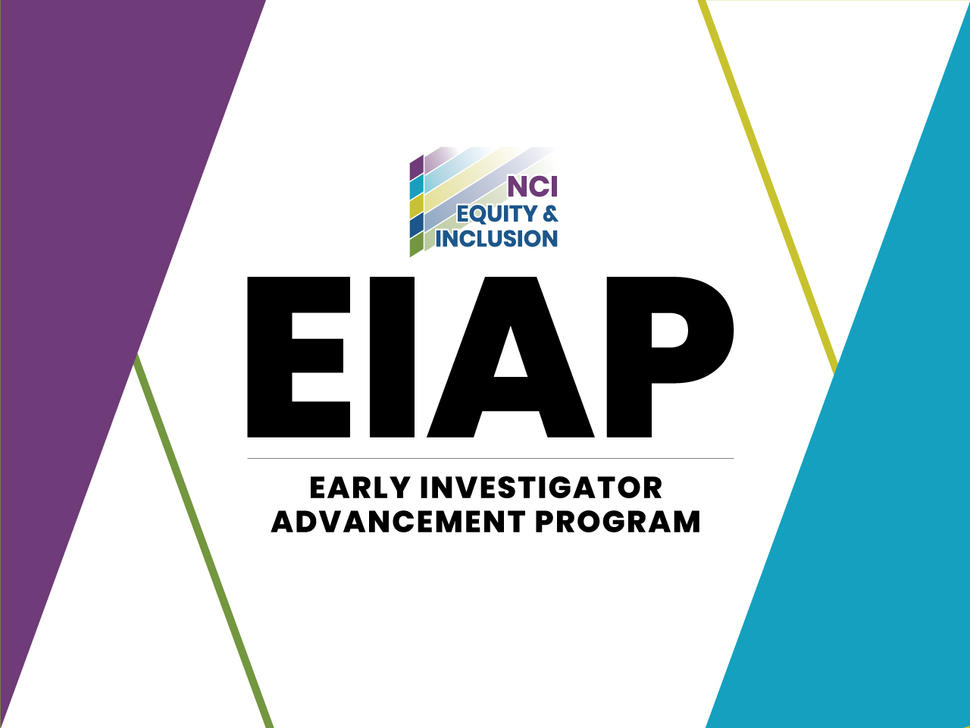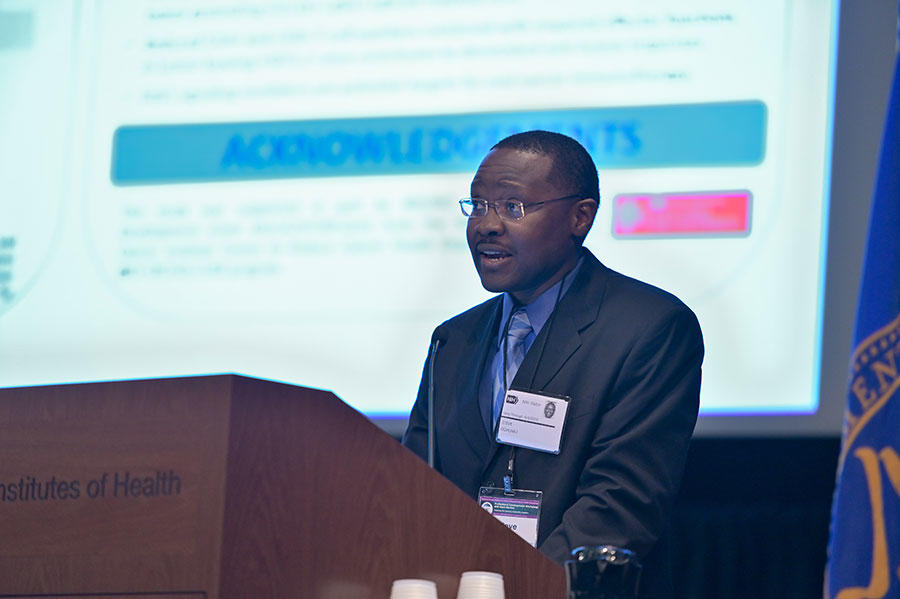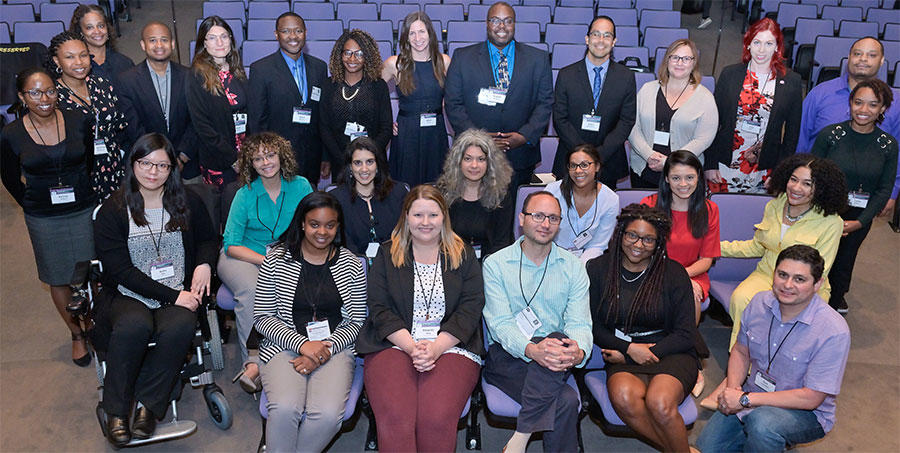Early Investigator Advancement Program (EIAP)
Welcome to the Early Investigator Advancement Program (EIAP)! The National Cancer Institute (NCI) launched the EIAP with the support of the NCI Equity Council in 2021. EIAP is a trans-NCI program that aims to assist cancer researchers and clinician scientists to attain an R01 or R-type equivalent funding.
A pool of skilled cancer researchers and clinician-scientists is necessary for the cancer research field to flourish. The shift from junior investigator to established investigator status is crucial in this process. The EIAP strives to bolster expertise and offer guidance for the creation of a competitive R01 grant application. The program also provides access to mentoring and peer networks and fosters a community of up-and-coming established investigators from diverse backgrounds.
NCI is particularly interested in encouraging applications from individuals from the extramural community who have a strong interest in cancer or cancer health disparities research, who can commit to the program requirements, those who have previously applied, and individuals from diverse backgrounds including those from groups underrepresented in the cancer research workforce. For example, those from groups noted in the Notice of NIH’s Interest in Diversity (NOT-OD-20-031).
EIAP Overview
The EIAP is designed to assist eligible and qualified Early Stage Investigators (ESIs) and New Investigators (NIs) from institutions across the country in their professional and career development. Its goal is to facilitate the transition of junior investigators to established investigators while advancing NCI's dedication to diversity, equity, inclusion, and accessibility. The EIAP offers support in developing professional skills, constructing an R01 grant application, and connecting with mentors and peers to foster a diverse community of emerging established investigators.
Each year, the EIAP team selects 20 to 25 Scholars (depending on funding availability) and 50 Associates through a rigorous and competitive application and review process. Being designated as an EIAP Scholar or EIAP Associate is a great career development opportunity.
Cancer researchers and clinician-scientists who are keen on improving their grantsmanship abilities, building their peer network, having a dedicated mentor, and obtaining access to career development resources are invited to apply for the EIAP program. We welcome both new and resubmitted EIAP applications.
Is EIAP Right for Me?
Review the following statements to see whether EIAP is for you (see full eligibility criteria below):
- I am a citizen or non-citizen national, or Permanent Resident of the United States.
- I am a researcher or clinician scientist from the extramural community.
- I have never been a PI or MPI on an NIH R01 or equivalent grant before.
- I am currently conducting cancer or cancer health disparity-related research.
- I hold a junior investigator position at my institution and qualify as an ESI or NI.
- My institution supports me in submitting an R01 application by October/November 2024.
- I am prepared to work toward and submit an R01 application by October/November 2024.
- The R01 that I am including in my EIAP application is not currently under review.
- I am able to participate in all program activities.
| Date (All times Eastern Time) | Activity |
| February 6, 2024 | Scholar Orientation |
| February 13, 2024, 1:00-4:30 pm | Grant Writers' Seminar Day 1 |
| February 14, 2024, 1:00-4:30 pm | Grant Writers' Seminar Day 2 |
| End of February-Early March 2024 | Scholar 1 on 1 (more information to come) |
| March 20, 2024, 11:00 am | Pre-Proposal Due (more information and guidance will be provided once the program starts) |
| April 4, 2024 | EIAP Peer Networking Event |
| May 2, 2024 (Morning, TBD) | Group Workshop Session |
| May 2 or 3, 2024 (Afternoon, TBD) | One scheduled one-on-one session with a grant expert to discuss your pre-proposal |
| TBD | Mentored Mock Review Orientation |
| May-June 2024 | Scholar 1 on 1 (more information to come) |
| May 8, 2024, 1:00-5:00 pm | Mentored Mock Review |
| July 24, 2024 | Final Grant Proposal for Grantsmanship Review |
| August-September 2024 | Scholar 1 on 1 (more information to come) |
| October/November 2024 | Submit Grant Application |
NCI values diversity and particularly encourages applications from individuals from diverse backgrounds, including those from groups underrepresented in the cancer research workforce, for example those from the groups noted in the Notice of NIH’s Interest in Diversity (NOT-OD-20-031).
EIAP Selection Criteria
Individuals considered for the Scholar position are chosen based on their junior investigator status and the quality of their application materials. Applications are scored on a 1-9 scale (EIAP reviewers use the standard NIH Scoring Guidelines for Trainees) and the scores are compiled across reviewers. Those scoring in the highest tier are invited to be Scholars, and those scoring in the next highest tier are invited to be Associates (if they have not previously been an Associate). Those not scoring in the two highest tiers are welcome to apply again for the next cohort. The scoring criteria are:
- Research Experience and Accomplishments
- Training and Professional Accomplishments
- Institution Support
- Draft R01 Proposal
- Letters of Reference
Program Components
Scholars are expected to participate in the following virtual program components:
- A Grant Writing Workshop (2 half days with a free copy of Grantsmanship Workbook included)
- Individual consultations with a nationally renowned NIH grants expert
- Mentored Mock Review (MMR) session
- Engagement with a volunteer mentor
- Individualized consultation with EIAP team members
- Engagement with a grant writing expert to review and help refine the Scholar’s R01 in preparation for submission in October/November
- Career development workshops and webinars
- Continued engagement with EIAP team members beyond the Scholar’s program period to provide support in the Scholar’s path to success
Associates are expected to participate in the following virtual program components:
- A Grant Writing Workshop (2 half days with free copy of Grantsmanship Workbook included)
- Mentored Mock Review (MMR) session
- Career development workshops and webinars
The application period opened on October 2, 2023, and closed on December 1, 2023. No late applications will be accepted. Applicants should expect to be informed of their status based on the timeline below. The target start date is February 13, 2024.
Early Investigator Advancement Program 2023-2024 Timeline
The EIAP Experience
Build your grant preparation skills and prepare an R01 grant application! As an EIAP Scholar, you will be guided through the grant-writing process from drafting your Specific Aims section through submission. You will also gain important insights into the process of NIH review committees. To start the program, you will take part in a two, half-day grant writing virtual seminar. Then, you will participate in a hands-on workshop which includes individual meetings to review and revise the Specific Aims section of your application prior to submission. Your full R01 application draft will be reviewed by a grantsmanship expert, and you will receive detailed, written feedback. Finally, you will participate in a mock review to gain insight into how R01 applications are reviewed by an NIH review committee. Valuable examples of NIH-funded R01 applications, summary statements, sharing plans, leadership plans, and more can be accessed on the NIH Grants & Funding site.
Connect with mentors and grow your professional network! As an EIAP Scholar, you will have the opportunity to connect with multiple mentors, including established investigators, scientists in different sectors, as well as near-peer and peer mentors. Activities will be held for each EIAP cohort to encourage peer mentoring and community building.
Learn and grow through a professional and career development webinar series! EIAP scholars will have access to a series of focused webinars important to aspiring researchers. These webinars may include, for example, research priorities at NCI, components and key elements of a grant proposal, how to be a proactive mentee, establishing and growing a research group, post-award grant management, and other relevant topics.
Apply to EIAP
Application Requirements
To apply to the NCI Early Investigator Advancement Program (EIAP), the following documents should be prepared. Fully completed applications are due by 11:59 p.m. (in your time zone) on December 1, 2023.
To apply for the NCI Early Investigator Advancement Program (EIAP), the following documents should be combined into a single PDF file and emailed to EIAP@nih.gov. Please save the file as EIAP_Lastname_Firstname.
- Cover Letter: Submit a signed cover letter (no longer than 2 pages, single spaced) that includes:
- Name
- Email Address
- Current institution
- Statement that you are a citizen, non-citizen national, or legal permanent resident of the United States. Do not send documentation with your application.
- Statement indicating you have not previously received NIH R01 or equivalent funding as a Principal Investigator.
- Statement indicating preparedness to submit an R01 (which includes a draft R01) by October/November 2024 (see the "Draft R01" bullet below for full details).
- Statement indicating whether you are an Early Stage Investigator or New Investigator.
- Your immediate and long-term career goals.
- Cancer research type (i.e., basic, translational, behavioral/population, or clinical) and site (e.g., lung, brain, skin) if appropriate.
- If applicable, indicate if your research directly aims to impact cancer health disparities.
- Please let us know how you heard about EIAP.
- Please let us know what you are looking for in a mentor (e.g., qualities, areas of research, etc.)
- Additional information you feel is relevant.
- Draft R01: Your draft R01 should include:
- Project Summary/Abstract (1 page)
- Specific Aims (1 page)
- Research Strategy (no more than 12 pages including significance, innovation, approach, which includes research design, justification, expected outcomes and/or impact)
- Statement indicating plan to submit IRB approval if applicable.
- Bibliography
- R01 must comply with NIH standards where otherwise not specified
- Institution Letter: Provide a letter from appropriate institution leadership in support of your intentions to submit an R01 application by October/November 2024. This letter should include reference to support, equipment, and other physical resources available that will be adequate to support an R01 application. Additionally, the letter should provide a statement with regard to current mentoring support.
- NIH Biosketch: Please refer to the NIH for guidance and an appropriate template.
- References: Provide two letters of reference from individuals who can comment on your potential as an R01 investigator. Letters should be on institutional letterhead and signed.
NCI values diversity and particularly encourages applications from individuals from diverse backgrounds, including those from groups underrepresented in the cancer research workforce, for example those from the groups noted in the Notice of NIH’s Interest in Diversity (NOT-OD-20-031).
EIAP Eligibility
To be eligible for the EIAP:
- Applicants must be citizens, non-citizen nationals or Permanent Residents of the United States.
- Applicants must be Early Stage Investigators (ESI) or New Investigators (NI) who are currently actively conducting cancer research or cancer-related research.
- Applicants have not previously competed successfully for NIH R01 or R01 equivalent funding.
- An applicant must be holding a current position at an institution that is eligible for an R01 application and is supportive of the applicant’s plans to submit an R01 application by October/November 2024.
NCI is particularly interested in encouraging applications from individuals who are from diverse backgrounds, including those who are from groups underrepresented in the cancer research workforce, for example those from the groups noted in the Notice of NIH’s Interest in Diversity (NOT-OD-20-031).
Other Considerations
NCI encourages applications from scientists who participated in the NCI Center for Cancer Health Equity (CCHE) Continuing Umbrella of Research Experiences (CURE), CCHE's Partnerships to Advance Cancer Health Equity (PACHE), NIH's National Research Mentoring Network, the NIH Building Infrastructure Leading to Diversity (BUILD) Initiative, and/or the NIH Faculty Institutional Recruitment for Sustainable Transformation (FIRST) Program.
Contact
You are encouraged to pose your questions to EIAP program staff. Please contact JoBeth McCarthy, Dan Eckstein, and Dr. Maria Jamela (Jay) Revilleza at EIAP@nih.gov.



